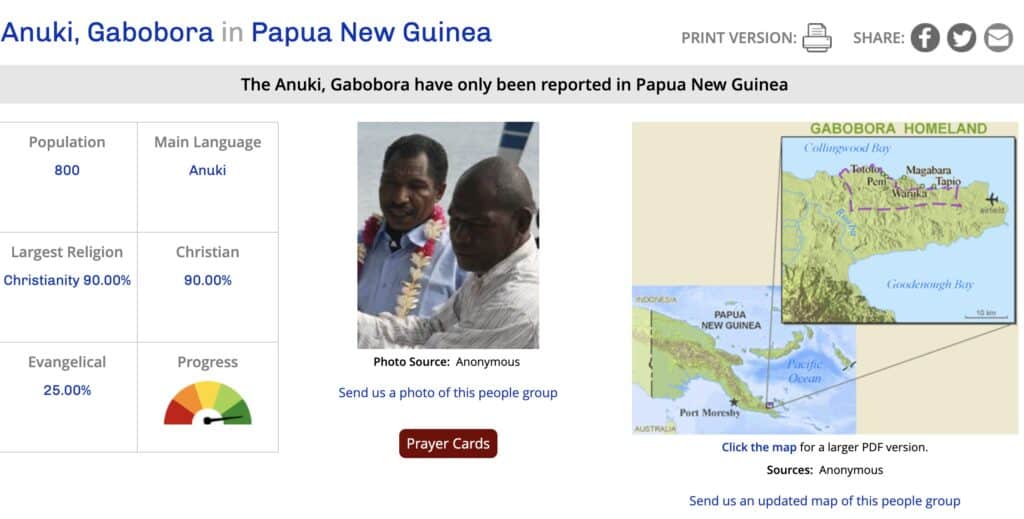The Anuki language is an Austronesian language spoken by the Gabobora people along Cape Vogel in the Milne Bay Province of Papua New Guinea.
The language was named after a highly respected deity of the people, whose sacred remains now rest in Australia.

Introduction / History
The Gabobora people live along the north coast of Cape Vogel, Milne Bay Province, Papua New Guinea. Each of the villages is well-kept, sometimes with grassy compounds. Peripheral decorative shrubbery, coconut palms, and mango trees mark most villages. There are abundant local fish, birds and wildlife.
Celebratory feasts are part of the routine of the Gabobora peoples’ lives – for weddings, funerals, the birth of first child, and harvest. Large competitive feasting events are within living memory of all of the adults of the community (Cf. Michael Young, 1971. Fighting with Food). The people have a strong sense of cultural identity that is now intricately woven within activities of the Anglican Church as well as local sport. In sport the Anuki field teams in volleyball, netball (a kind of basketball), and football (soccer) for local competition.
Church activities fill the weekly calendar. Their church services are conducted in regional languages as well as English, with announcements and lay comments in Anuki. However, they lack Anuki Scriptures in the church context. These would add immeasurably to their understanding of the religious practices faithfully followed by so many. Priests and lay leaders alike have expressed the desire to have God’s Word in the Anuki language. Outside sources have noted them to be “very interested” in having such a translation.
The Anuki community has produced three illustrated short-story booklets by Gabobora authors, all penned in the Anuki language, and a small hymn book of Anuki choruses. Recently they joined project VITAL (Vernacular Initiative in Translation And Literacy), a multi-language translation project in Milne Bay province. Through VITAL the Anuki translation team has started working on a dictionary. They have completed chapters four to six of Mark and twenty trial copies have been distributed.
The Anuki people only use Anuki numbers as far as five. Beyond that, they use English numbering system now. They have an old counting system up to twenty. Anuki is an endangered d language spoken by about 600 speakers in the north coast of Cape Vogel, Milne Bay province, Papua New Guinea. Source
| 1. tana / ta’naɣa |
| 2. bata |
| 3. ʔaroba |
| 4. ruwa ma ruwa (2 + 2) |
| 5. imikovi (lit: ‘one hand) / imana i kovi (lit: ‘one hand finished’) |
| 6. from 6 to 9 use English numerals now |
| 10. ima bata (lit: ‘two hands) / imana bata i kovi (lit: ‘two hands finished’) |
| 11. from 11 to 19 use English numerals now |
| 20. tomoɣa tana (litː ”one man”) / tamoina i rabobo (litː ?) |
